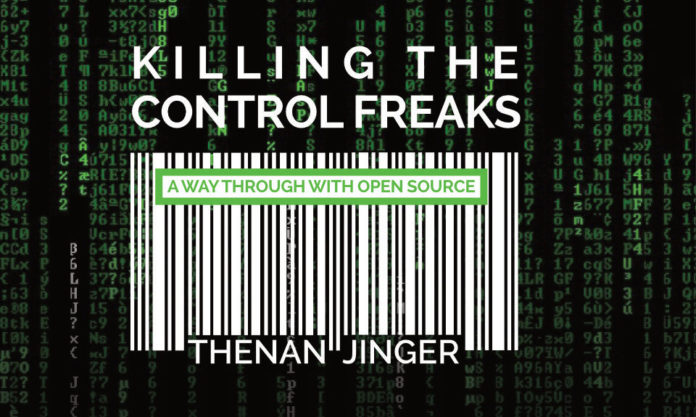Think about it. Your electronic devices, that you have with you right now, can connect to any other device on the planet over the internet, for desired deeds or otherwise nefarious activities. Do you know what code runs on your devices? Do you trust every developer and company that has made each and every single app you use?
In this day and age, it is truly a rarity to have control over what our own devices are doing. Companies and corporations create software that is proprietary and fully controlled by them; we users just accept their terms of service and privacy and unknowingly use what’s available for convenience. The code and control behind the software is completely hidden behind company walls. The advent of the internet has given us access to everything out there as much as it has given everything out there access to us.
Governments often require technology companies to implement backdoors for surveillance, and most companies comply. Yet what stops huge multi-trillion-dollar software companies from using our data in whichever way they desire?
Whether that is selling your personal data to advertisers for a profit or allowing companies to track and build a profile around you across the web, there are rarely transparent policies or clear-cut regulations.
We pay the price of these, often free, online services, by giving up our privacy. This extends beyond just online services; the companies that build the hardware of the devices we use ourselves are subject to the same conditions.
At what point will you be shown advertisements for pampers and pacifiers before you even know your wife is expecting? How much of your personal information do you want to be available for devastating identity theft if any of the hundreds of proprietary services you rely on is breached?
What is open source? What does it mean for you?
Publicly available, transparent and independent software; this is open source. With publicly available code, open-source software allows users not only to inspect everything the software is doing, but also to modify it in any way. While this might seem counter-intuitive in terms of profit, there are methods which allow open-source projects to still make money.
That said, most open-source software continues to be freeware and funded by donations. Yet many come with just as much, if not more, functionality than commercial solutions. Most impressively perhaps, is how heavily corporates rely on open-source software to build their own proprietary (closed-source) services.
Fully 93.6 percent of the top 1 million websites today are hosted by open-source software. Some 90 percent of cloud infrastructure runs on open-source software and it’s done with one open-source software project alone; the Linux operating system. Dominating the enterprise market for its security and customisability, Linux is unmatched by closed-source solutions.
That said, very few users, like me and you, are taking advantage of open-source software. The barriers to entering the world of open-source software are ever-lowering; consider what this could mean for you. Perhaps it’s protecting your own privacy from government-issued back doors (thank you, Edward Snowden) or taking control of hardware devices so that “software updates” don’t slow down and hamper them (we’re talking about you, Apple, and your hopes to drive sales for new models).
Governments provide very little to no accountability from companies to customers; corporates have free reign in how their software and hardware operate and the data their services collect. Using open-source software alternatives is one of the few ways to ensure true privacy and control; it is made for the people, by the people.
The Compromise: Technicality, Profit & Active Development.
The current reality of open-source software is a three-way compromise between the added technicality, the non-profit model of open-source and how consequently that sometimes hinders active development.
The dual cores of successful open-source software are frequent updates and maintenance, yet without the profit incentive it is up to developers who donate their time and expertise and the popularity of open-source projects to bring about incentives that drive community-driven development. This inevitably raises the barrier for small, open-source projects to become usable in critical applications, and sometimes leads to an abundance of abandoned open-source projects.
As a consequence, there are licences that come with open-source software which, by law, limit what contributions must be made and whether open-source projects may be used for profit. And this is true for each specific open-source project; there are limitations and obligations to using it.
Lastly, perhaps the most significant compromise for normal users is the added technicality that open-source software often brings; being fully customisable means that setting up and using open-source software is often cumbersome or impossible for the non-tech savvy. As the open-source community is itself technically skilled, there is little reason to put effort towards accessibility and ease-of-use within most projects. This is reason alone for most individuals to opt for proprietary, but easy-to-use commercial software from closed-source corporates.
Will You Take Control?
While you may not have control over how companies use your data and your devices, it is your choice which services and software you use. You have the power to choose open-source software and to benefit from control, customisability, and privacy. It can be as simple as choosing an open-source application over a closed source solution (eg. Using VLC as your media player) or as extensive as exclusively using open-source software. The choice is yours.
Although China tends to create their own proprietary software solutions, there has been a wide adoption of open-source software and hardware. This thriving community of developers, with lower brand-loyalty and lower consumerism mentality towards tech companies when compared to the west, is an environment more open to open-source technologies.
Is control of your own data and devices something significant for you? If so, evaluate the compromises of open-source solutions. Share the knowledge that may help us be one step closer to a world where large corporates and governments don’t take control away from us, the users.









